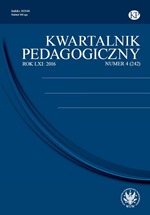Importance and dimensions of ESL in Poland – school staff’s perception
Importance and dimensions of ESL in Poland – school staff’s perception
Author(s): Paulina Marchlik, Hanna Tomaszewska-PękałaSubject(s): Social Sciences, Education
Published by: Wydawnictwa Uniwersytetu Warszawskiego
Keywords: early school leaving; multilevel/tripartite approach; reproduction theory; resilience; risk and protective factors
Summary/Abstract: Early school leaving (ESL) is an issue of serious concern of the European Union as one of the factors contributing to youth unemployment, poverty and low educational achievement (Commission of the European Communities 2001: 39). In Poland, however, the phenomenon is not perceived as a problem or a major challenge for the Polish education system for the future. Poland, having one of the lowest ESL rates among EU countries (about 5%), is mentioned among the countries which are already achieving the EU benchmark 2010 of less than 10% of ESLers (GHK 2005: 7). The applied in RESL.eu project theoretical approach (called: multilevel or tripartite approach) assumes that the falling out of education is a complex process, which has as its core three levels of overlapping factors: the individual, the institutional and the structural/systemic ones. In this article look at how the phenomenon of early school leaving is perceived by the staff of upper secondary schools in Warsaw. We present the results of analysis of individual interviews with principals, teachers, pedagogues, psychologists and counsellors and focused groups discussions (N=21) which took place in four schools situated in Praga and Targówek districts. We argue that the staff from upper secondary schools, explaining the determinants of ESL, stress the significance of the micro level factors, referring to their everyday experiences in working with students experiencing school failure, or focus on the systemic/macro level factors and emphasise the shortcomings of the Polish education system, seeking possible sources in its deficiencies. Whereas the factors of the institutional, that is school level, are dismissed as relevant aspects that may help to explain this phenomenon.
Journal: Kwartalnik Pedagogiczny
- Issue Year: 242/2016
- Issue No: 4
- Page Range: 156-169
- Page Count: 11
- Language: English
- Content File-PDF

